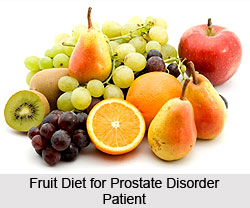 In the natural remedy of prostate disorder, the patient should abstain from all solid foods and live on water only for two or three days. The intake of water should be as plentiful as possible. Nothing should be added to the water except a little lemon juice, if desired. The water may be taken cold or hot and it should be taken every hour or so when awake. This will to a great extent augment the flow of urine. An enema may be taken once a day during fasting to clear the lower bowel of accumulations. After a systematic cleansing of the bowels, hot and cold applications may be used directly on the prostate gland and its surrounding parts. The heat relieves the tissues and a short cold immersion tones them up. The patient should take alternate hot and cold hip baths. These are of great value in relieving pain and reducing congestion.
In the natural remedy of prostate disorder, the patient should abstain from all solid foods and live on water only for two or three days. The intake of water should be as plentiful as possible. Nothing should be added to the water except a little lemon juice, if desired. The water may be taken cold or hot and it should be taken every hour or so when awake. This will to a great extent augment the flow of urine. An enema may be taken once a day during fasting to clear the lower bowel of accumulations. After a systematic cleansing of the bowels, hot and cold applications may be used directly on the prostate gland and its surrounding parts. The heat relieves the tissues and a short cold immersion tones them up. The patient should take alternate hot and cold hip baths. These are of great value in relieving pain and reducing congestion.
After the short fast, the patient should adopt an all-fruit diet for three days. The fruits should include apples, pears, oranges, grape-fruit, grapes, sweet limes, mangoes, melons and all other juicy fruits. This will help to clear toxins from the body and will also enable excess fat to be reduced to some extent. The exclusive fruit diet should be followed by a diet, consisting of two meals of fruits and one of cooked vegetables for further seven days. The vegetable meal should be taken in the evening and should consist of all kinds of cooked vegetables, preferably steam cooked. Thereafter, the patient may adopt a well-balanced diet of three basic food groups, namely (i) seeds, nuts and grains, (ii) vegetables and (iii) fruits.
The short lemon juice fast followed by an all-fruit diet and a further period on fruits and vegetables may be repeated after two or three months if required depending on the improvement being made. Pumpkin seeds have been found to be a successful home medication for prostate problems and many patients have been helped by their use. These seeds are rich in unsaturated fatty acids which are essential to the health of the prostate. Heavy starches, sweet stimulants and highly seasoned foods are totally forbidden, as they cause direct irritation on the prostate gland and bladder. The diet should also keep out spices, condiments, salt in excess, sauces, red meats, cheese, asparagus, watercress, greasy or fried foods, alcohol, tobacco and too much tea or coffee. The patient should avoid hurried meals and must chew his food thoroughly and slowly. Water should be taken between meals and not at mealtime.
The patient should avoid irregularities in eating and drinking, long periods of sitting and vigorous exercise. He should guard against constipation by taking plenty of fruits, bran and nuts. All efforts should be made to tone up the general condition of the body. With a general improvement in health, the condition will be greatly relieved.




















